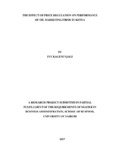| dc.contributor.author | Njagi, Ivy, K | |
| dc.date.accessioned | 2017-12-20T08:31:05Z | |
| dc.date.available | 2017-12-20T08:31:05Z | |
| dc.date.issued | 2017 | |
| dc.identifier.uri | http://hdl.handle.net/11295/102132 | |
| dc.description.abstract | Petroleum price regulation was introduced in Kenya in December 2010 after Energy Regulatory Commission was granted the mandate. This was after Kenya was faced by stiff price increase of petroleum products between the year 2007 and 2011. It was observed that before regulation was introduced oil firms were taking advantage of international price changes to exploit the general public. Due to the need to protect consumers, public complains and dissatisfaction the government introduced regulation of prices on oil. It is for these reasons and others that this study was conducted with the objective being to establish whether there exists a relationship between price regulation and financial performance of oil marketing firms in Kenya. The study covered 8 years from 2006 to 2013 and secondary data for thirty-one oil firms in Kenya was collected. The chi square test of differences was used to test for significance between introduction of price regulation and the performance of the oil marketing firms in Kenya. The dependent variable was the financial performance of the oil marketing firms in Kenya which were equated to the Return on Assets (ROA). The independent variables were Expenses Revenue Ratio, Sales to Equity Ratio, Fixed Asset Ratio and the Regulatory Regime. The study findings revealed that the introduction of petroleum price regulation has had a negative effect on the financial performance of oil firms in Kenya. The general financial performance of the oil firms as measured by ROA was better/higher in the period preceding petroleum price regulation period than in the period after introduction of the regulation. The local prices were way behind the international price quotations after introduction of price regulations in 2011. The study found that for sure regulation of prices on oil affected performance of oil firms financially in Kenya. Thus, the study recommends refinement of the ERC pricing formula to ensure that it accommodates and addresses the concerns raised thus far by the major stakeholders in the industry to ensure protection of the oil sector’s margins and subsequently enhance financial and overall operational performance which is bound to have a trickle-down effect to the whole Kenyan economy. The study also recommends that ERC criteria of regulation be reviewed in the consultation with all oil marketers and stakeholders to cushion them from costs not considered in the gazetted formula. | en_US |
| dc.language.iso | en | en_US |
| dc.publisher | University of Nairobi | en_US |
| dc.rights | Attribution-NonCommercial-NoDerivs 3.0 United States | * |
| dc.rights.uri | http://creativecommons.org/licenses/by-nc-nd/3.0/us/ | * |
| dc.subject | The Effect of Price Regulation on Performance of Oil Marketing Firms in Kenya | en_US |
| dc.title | The Effect of Price Regulation on Performance of Oil Marketing Firms in Kenya | en_US |
| dc.type | Thesis | en_US |



